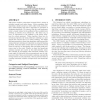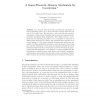17 search results - page 1 / 4 » Monotonic solution concepts in coevolution |
GECCO
2005
Springer
13 years 10 months ago
2005
Springer
Coevolution can be used to adaptively choose the tests used for evaluating candidate solutions. A long-standing question is how this dynamic setup may be organized to yield reliab...
GECCO
2005
Springer
13 years 10 months ago
2005
Springer
Assume a coevolutionary algorithm capable of storing and utilizing all phenotypes discovered during its operation, for as long as it operates on a problem; that is, assume an algo...
GECCO
2006
Springer
13 years 8 months ago
2006
Springer
Coevolutionary algorithms search for test cases as part of the search process. The resulting adaptive evaluation function takes away the need to define a fixed evaluation function...
GECCO
2007
Springer
13 years 11 months ago
2007
Springer
This paper explores connections between Ficici’s notion of solution concept and order theory. Ficici postulates that algorithms should ascend an order called weak preference; th...
GECCO
2003
Springer
13 years 10 months ago
2003
Springer
One problem associated with coevolutionary algorithms is that of forgetting, where one or more previously acquired traits are lost only to be needed later. We introduce a new coevo...


